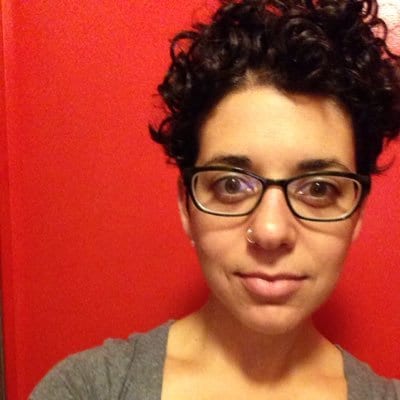
Writing Against: On Rachel Zucker’s “Poetics of Wrongness”
November 29, 2016
By Rachel Edelman
Three weeks ago, on Tuesday, November 8th, I left a reading in South Lake Union and walked west on Harrison. I attempted, unsuccessfully, not to look at the U.S. maps glowing so red on every bar’s television screen. I arrived at the bus stop knowing my own phone was dead, fearing my roiling anxiety would soon to be displaced by a not entirely different terror. I took out a pen and drew what stood in front of me: the Space Needle aspiring toward the waxing gibbous moon. I crosshatched the observatory windows, followed the sturdy frame to its disappearance behind the square buildings ahead of me. I willed my hand to stay steady.
This was before the public deluge of disappointment and shock upon Donald Trump’s victory. It was before I began to fear my Affordable Care Act-enabled health insurance would disappear, before I assured my mother my passport was up-to-date.
On election night, I arrived home to find my partner spinning in his desk chair, scribbling electoral arithmetic along with a listless David Brooks on PBS. Staring at what was in front of him, in front of me, in front of all of us, I broke into sobs. I howled; my cat howled back. I kicked and cried against my body’s response, willing it to stop, to contain itself. But containment is not how my body responds to grief for my country or fear for my friends’ and neighbors’ safety. My body unleashed itself in an emotional momentum not unlike what I experience in Rachel Zucker’s work.
Usually, I read poems slowly, pausing at the end of lines, finishing, then immediately reading it again—then again. But with Zucker’s work, my eye tips into a furious acceleration. She scurries and stumbles, breathless. She collects impressions, questions, acute impulses, and absurdities as she traverses an unstable present.
“pay attention.
This is not just the way you feel today. This is
the future retrospective portent that made it all
make sense,”
Zucker writes in “What Dark Thing,” a poem that constellates a narrative of commerce, desire, and resistance in a vast orbit around depression. Lines jump across expansive white space afforded by the extra-wide page in her book Museum of Accidents (Wave Books 2009). She deploys spatial chaos is to cataclysmic effect that stretches the reader’s emotional range.
“The Poetics of Wrongness rejects a poetry that wants to be unobtrusive or invisible in its form,” Zucker says. I first fell for poetry thanks to its tightest regulations. Back then, I believed in the circus of form as function, of every deviation as a statement of intent. Some contemporary poets might call my early education archaic, but my infatuation with rule-following taught me to carefully consider the space in which a poem exists. That a poem must wrestle with the page itself.
But today my rage cannot fit in a tidy stanza. The aftermath of Donald Trump’s election requires an expansive poetics: a poem that is long, unruly, and unrestrained. Zucker’s work fills that niche. She says, “The athleticism of poetry is the poet’s ability to stay in and with wrongness,” to agitate the edges of the impossibly terrible in the face of utter destruction. The only alternative to wrongness is silence. Zucker’s poems build to brief moments of coherence followed by dissolution. Failure is a given. “I write against,” she says, in the lineage of Adrienne Rich:
The rules break like a thermometer,
quicksilver spills across the charted systems,
we’re out in a country that has no language
no laws, we’re chasing the raven and the wren
through gorges unexplored since dawn
whatever we do together is pure invention
the maps they gave us were out of date
by years… we’re driving through the desert
wondering if the water will hold out
the hallucinations turn to simple villages
the music on the radio comes clear—
neither Rosenkavalier nor Götterdämmerung
but a woman’s voice singing old songs
with new words, with a quiet bass, a flute
plucked and fingered by women outside the law.
—Adrienne Rich, “Twenty-One Love Poems”
Rich’s oeuvre embodies the shift from a hermetic, accommodating aesthetic to a wide-ranging free verse that rejects closed reading. On Zucker’s podcast Commonplace, Rich’s poetry and prose are frequent topics of conversation. In these “conversations with poets and other people,” Zucker gently agitates her guests, teasing out the mechanics of their practices and obsessions. Her voice wavers at points, her questions sometimes timid, but she lets listeners hear her working through confusion and doubt—she doesn’t edit it out. She says in her lecture, “The Poetics of Wrongness knows that summoning people out of words and mangling real people (with and without words) is always an act of getting them wrong.”
It is both a terror and a relief to see the mercury break free. In moments of emotional shattering, poetry becomes a risk with real consequence. Now more than ever, we need a poetry that confronts the peril we face.
 Rachel Edelman grew up in Memphis, graduated from Amherst College with a B.A. in English and geology, and taught environmental education in Maine and Colorado before settling in Seattle. Her poems, essays, and reviews have been published or are forthcoming in The Threepenny Review, Poetry Northwest, Southern Humanities Review, and other journals. She holds an MFA in poetry from the University of Washington, where she was awarded the 2016 Loren D. Milliman Fellowship. Find her on Twitter or on her website.
Rachel Edelman grew up in Memphis, graduated from Amherst College with a B.A. in English and geology, and taught environmental education in Maine and Colorado before settling in Seattle. Her poems, essays, and reviews have been published or are forthcoming in The Threepenny Review, Poetry Northwest, Southern Humanities Review, and other journals. She holds an MFA in poetry from the University of Washington, where she was awarded the 2016 Loren D. Milliman Fellowship. Find her on Twitter or on her website.